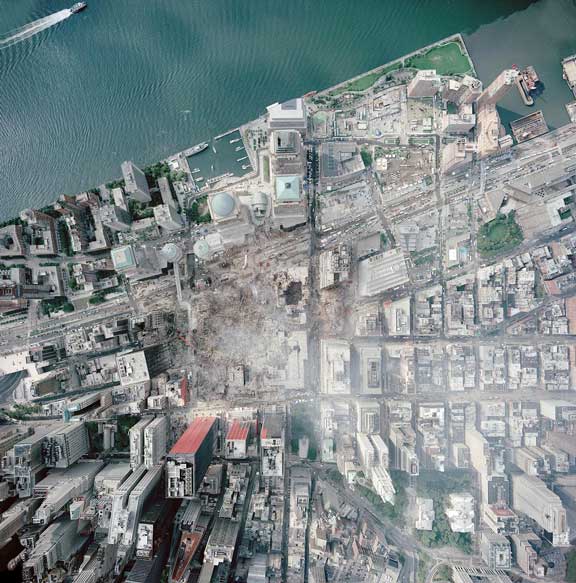 |
|
What Did This Do To Us? |
| FTLComm - Tisdale - Tuesday, January 22, 2002 |
| A little over three months have passed since the Tuesday, September 11, 2001 morning
when nineteen suicidal people gained control of four passenger aircraft and used
them as fuel bombs, to striking sky scrapers that now leave this gapping hole in
Manhattan while a third hit the United States military headquarters in Washington.
The fourth aircraft dug a substantial hole in a field in Pennsylvania Three months
is not enough time for us to have a good grasp of the importance of this tragic morning
on the history of the people of this planet so since we haven't the needed perspective
of time we do need to adjust our awareness to register the consequences and see how
this event has impacted on our own lives. The obvious things like changes in airport security, increased costs of travel, slower movement of goods over the international boundary and the clatter that passes for news on television as the US networks have all become government propaganda agencies of President Bush and his administration There has been a war, United States bombed the government forces of Afghanistan and that impoverished land's Northern Alliance mounted an offensive and appears to have polished off the ruling Taliban regime Though American and British land forces are supposed to have been involved mostly they have spent their time in the background of the conflict. But in terms of my life and yours it is much harder to see the direct and indirect affects. I think in time we will come to realise that our perceptions and attitudes have changed, we have for reasons of safety deferred to government more authority over our lives and by so doing relinquished the self determination of all of us. As I was thinking about this problem I wondered how my great grand father and great grandmother would have  viewed this situation. This picture of them was taken about one hundred
years ago in a village in Southern England where both of them would die just after
World War I. Before the war three of their sons had made their way to Canada to become
farmers on the Saskatchewan prairies. After the great war a fourth son would also
make the journey across the ocean to live out his life in North America. viewed this situation. This picture of them was taken about one hundred
years ago in a village in Southern England where both of them would die just after
World War I. Before the war three of their sons had made their way to Canada to become
farmers on the Saskatchewan prairies. After the great war a fourth son would also
make the journey across the ocean to live out his life in North America.Struggling to make a living for his family this man and his wife had lived through the development of modern representational democracy, during his father's time and the life of his grandfather their had been turbulent times so turbulent that a some point during the evolution of a constitutional monarchy the family had to take a different name so that today we have the family surname of "shire" the name used to describe a region of land. But this man would have looked back on the hundred years before and seen a steady and gradual development of democracy where people gained the right to vote with a secret ballot and live their lives safe knowing that the laws of the land protected them. Would William from his vantage point at the beginning of the twentieth century with his young sons heading off to the wilds of North America be able to see a pattern that would assure them of a measure of fairness and affective lives? I really think so. As young Englishmen going to British North America, now called "Canada" there was the assurance that land could be purchased and farmed, choices made in life to self determine the sort of lives they would choose and all the while knowing that the traditions of democracy and civility of life won during his and his grandfather's lives would be theirs to enjoy. We can't tell now if the hastily drawn up legislation called bill C-36 will ever be used, or challenged in court as it seems to run counter to the provisions entrenched in the Charter of Canadian Rights and most likely violates the provisions of the Magna Carta drawn up centuries ago. During this man's life there was trouble around the world, a war in South Africa, rumors of a coming war in Europe with Germany, deep and almost certain calamity to occur in the Queen's other grandson's Empire of Russia and in India British and Russians were sparring over the Kibbur pass and the wilderness that is today known as Afghanistan. There were serious problems just across the water on the island of Ireland, troubles that remain unsolved to this very day but amidst all of that, he could stand safely on his cobblestone yard with his wife and dog in a civilised country with civilised laws and be without fear of terrorism or aircraft falling from the sky. (Though a hundred years seems like a long time it would be within his lifetime that airplanes were invented and his sons crossed the Atlantic easily on semi-safe ocean liners, one son and his family made that trip twice.) In earnest we need to weigh the times in which we live and demand more of those who serve us in government. We have seen troubles before as a people and we have not lost sight of our traditions, our civility and our genuine respect for each other and each others rights as human beings. God Save the Queen! Timothy W. Shire. |